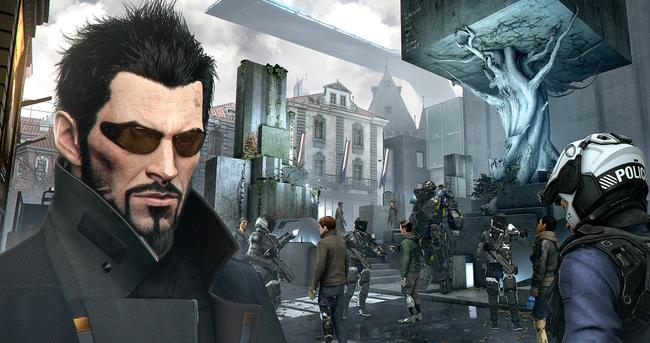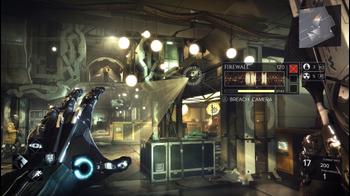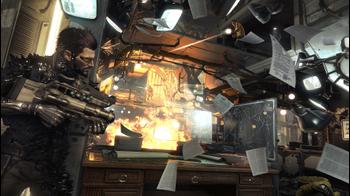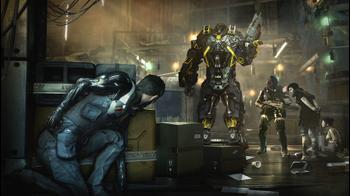
Deus Ex Interview: Exploring the world & narrative of Mankind Divided
Where would a decent role playing game be without a compelling story, or at least a well-built world with which to take up roles in? World building was arguably the biggest success of 2011's Deus Ex: Human Revolution, Square Enix's prequel to the classic PC RPG which heralded a return for the franchise to the top of the triple-A video game space.
With that success comes the pressure of sequels, and often universes feel the strain under the weight of a rapidly-expanding universe that must support multiple properties. One of those most responsible for bearing the weight of Deus Ex's impressively sized and considered worldview is Mary DeMarle, now serving as Lead Writer on Deus Ex: Mankind Divided at Eidos Montreal.
We sat down with Mary to discuss the challenges of crafting such a game world, what's narratively new for Mankind Divided, and the thought process behind some of the game's narrative choices.

RPG Site: So, the last game ended with a big choice... which puts you in an interesting situation when creating a sequel. How do you deal with that?
Mary DeMarle: Well, when we started Human Revolution, we had no plans to do a sequel. We were just so focused on how to bring Deus Ex back and how to do a good job at it that we really weren't thinking beyond that. From a story perspective I also certainly wasn't thinking beyond that.
It became that by the end of the process, when we got to the end of Human Revolution, that we pretty much realized we had to do another one. At that point we kind of as a team sat down; the core group sat down together and started asking, 'What do we want to do with this? Where do we want to take it?' I think relatively soon we figured out that we were looking at the fact that at the end of Human Revolution you have this massive tragedy, this massive event. We started to ask... what would we like to explore with that?
One of the things that strikes you is the idea that... y'know, when the world is faced with such a big event, the biggest loss of life, how do we as human beings react to that? That kind of gave us the idea of... okay, thematically it's interesting to look at reason versus emotion and how we deal with that.
Also to look at the idea that we wanted to say that from a choice standpoint. The player made a choice at the end. It was a very important choice they had to make, so how do we go beyond that. We quickly realized that when Jensen sends out that message, most people when they're dealing with an event like that, they're not listening to the news right away. They're too focused on the immediate tragedy. That gives a lot of opportunity for people to start spreading rumours and disinformation; people will believe what they want to believe.
That kind of freed us up, from a story standpoint, that Jensen - you did get a message out, and the message you chose was the message you sent out. Now you have the face the idea of, well, when the world is in such a big crisis like that, your job's not done after sending the message and you have to work further.
Coming up with that kind of helped us to push it further and also encouraged us to look at Jensen as a character to ask who is he now, what is his journey now - we kind of took off from there.
RPG Site: Something that's come up a lot with this game in particular are the parallels thematic to the real world, and the question of how far is too far when you're dealing with difficult topics. That's a minefield - how have you been trying to navigate that? How aware of it have you been?
Mary DeMarle: It's a bit of a minefield at times, yeah. We've always sort of had this belief that we have some basic beliefs about this franchise - some of which is that we started out saying that the world is never black and white. We're always exploring shades of grey. We can't shy away from those topics.
We embrace going into those topics, we say let's look at things, let's try not to simplify, let's try not to look at it in black and white, and let's hold up a mirror to the world. We often talk about the license being anticipatory fiction rather than science fiction, and we do a lot of research into transhumanism and the science and technology, and try to make it as credible as we possibly can.
On top of that, it's all about choice and consequence, so we never want to tell you what to believe. We just want to present all the issues and allow you, through your choices and exploration of it, to figure it out while recognizing as we do that where yeah, there's times when we're like 'Wow', and we get a little nervous about treading into that territory, or nervous about using a term - because we know people will react badly to it.
I think you kind of have to just accept that people will react badly while it's not your intent to hurt or harm anybody with it. What we want to do is explore it. It's only by exploring it that we can learn as human beings about what we want and where we think things should go.
RPG Site: There's a big push all over currently for open world games. You've stuck with several smaller-scale hub areas. Were you ever tempted to go open?
Mary DeMarle: We're very committed to stick with where we were headed with Human Revolution. Open world games are a lot of fun, I like open world games myself, but you don't get that with Deus Ex. It's so story driven; it's about freedom and choice and consequences. And it was a real conscious decision that with the amount of story we need to put in and the world building and the crafting we're doing of this universe. Rather than go wide with open world, we should go dense and deep within the world.
I think the biggest challenge for us is the question of how we build something that feels open in gameplay and is yet somewhat constrained so that it'll enable you to go deeper and deeper with the freedom, the flexibility, the choices, and the narrative storytelling within the world itself. It was always a conscious decision to not embrace open world, but constrain it.
RPG Site: We spoke earlier about Deus Ex's ending, and how that kind of puts you in a touch spot for sequels. Now that you have what's clearly a successful franchise, has that changed your thinking for the ending this time in terms of how disparate it can be?
Mary DeMarle: When we finished Human Revolution we sat down and analysed that game, we analysed what we wanted to improve on all levels - level design, gameplay, etcetera. For story we said, y'know, it's very important to tell a strong and coherent story, but we also want to push the choices and consequences further. We'd like to have things that change based on your decisions and not just have it be at the end that you choose one of four options and there's your ending.
It's a big challenge to do it - a huge challenge - but on this one from the get-go, we embraced things like how in your experience there are things that can happen early in the game, if you do things that I don't do that, when you get deeper into the game, your critical path story is affected by that choice, and there is a ramification down the line, so your experience would be different to mine.
As we get deeper into the second act, there may be a moment where you have two things that have to be done but you cannot do them both and you must choose. As a result of that, that kind of alters things down the line as well. Although... we are still trying to keep it coherent, so you will get to similar points down the line, but your experience of it - you'll be coming in from a different direction. You'll be understanding things differently to how I was understanding them, coming from a different path.
That becomes a big challenge on the writing team. How do we craft that moment knowing that you might be coming in with one set of feelings on a topic, one set of emotions, but I might be coming in from a completely different place? We then have to satisfy both.
When we get to the final mission of the game, rather than boiling down to a moment with, boom, here's your choices, here's some buttons... it's right from the get-go that when you get in there, the choices that you're making right from the start are affecting and impacting your experience in that level. So, there are multiple endings, but it is also kind of pulling towards a coherent ending with different ramifications and different options that can happen.
RPG Site: So, every prior Deus Ex game has changed its protagonist. I love him, but, I have to ask - why stick with Adam?
Mary DeMarle: The funny story that we like to tell is... well, like I said earlier, when we worked on Human Revolution it was a one-shot deal. I was one of the people whom said, 'No, Adam's story is over! He's done, he's dead, whatever, we're not doing it!' But... at the same time, we realized relatively quickly that it's really hard to create a compelling hero character.
We somehow - through luck, through skill, through a combination - we hit upon a character who people love. I love him! It's so great to see how liked he is. At that point, we kind of had to bring him back because there's just... he's such a strong character that you want to know more of what happens.
At that point for me the challenge became... okay, we really do want to bring him back and push him further. With my head still saying 'his story is over', I then had to work to find that angle in that I can now tell his new story, and how he's changing.
RPG Site: I have to ask this, as an old-school fan... you're obviously still a prequel. How are you connecting with the original game this time around? Are you thinking a lot about that, or just focused on telling the story you want to tell?
Mary DeMarle: [laughs] I've thought about it a lot! You can't not think about it. You knew through Human Revolution that it was a prequel. We're in this timeline and in Human Revolution we're 25 years away from the original; we want to put in things because we know where we're going. I've thought about it a lot because I really like the idea that... well, you think you know where you're going... but history is written by the winners. In 2052, you play and you hear about the past through the eyes of the winners.
For me the really exciting thing is, we know where we're going. We have stakes in the ground and characters that are very important that'll have to play a part - but how do we get there? By allowing you to play the timeline we may actually change your understanding. When you get to that final point, you might be saying, 'Wow, I had no idea... the facts are true, but the experience itself is different.' So, I've thought about it a lot.



